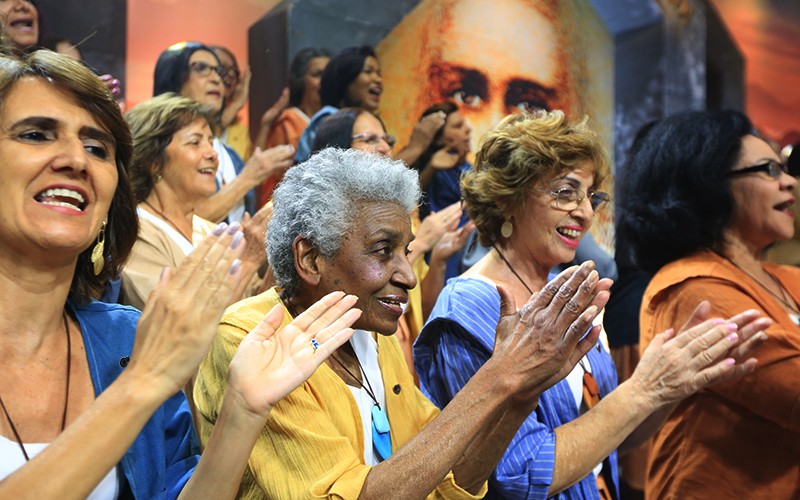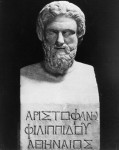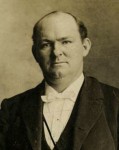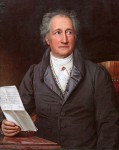Women in the Repair of Nations*
Friends, sisters and brothers, I ask for permission to pay a fair homage to women of all the segments of society, such as the ethnical, religious, scientific, political and cultural segments: to those who are the mainstay of nations when they are living in tune with God and/or the most sublime feelings that ennoble the human race, by displaying the text I have written which was forwarded to the UN and translated by this organization into its six official languages (Arabic, Chinese, English, French, Russian, and Spanish). It was distributed during the 51st Session of the Commission on the Status of Women, in 2007 at the United Nations headquarters, in New York. This event always counts on the presence of the LGW, which transmits its message of peace to delegations around the world, as it once again occurs this year.

“Bread and roses”

Aristophanes
The fight for the emancipation of women is old. In the classical times in Greece, this libertarian spirit pursued, under a certain aspect, its path by means of the efforts and difficulties of Lysistrata, with her idea of sex strike, which motivated women from Athens and Sparta, having the aim of averting the Peloponnesian War, according to Aristophanes’ comedy.

Clara Zetkin
In 1857, hundreds of textile and clothing women workers in factories in New York started a strong protest against their low salaries, a more than 12-hour working day and very poor working conditions. In 1908, more than 14 thousand of these women returned to the New York streets. With the slogan “bread and roses”—“the bread being the symbol of economic stability, and the roses representing a better quality of life”—they demanded the same rights as those claimed by the female workers in the 50s, in the 19th century. Approximately 130 of them died during a mysterious fire. But this was not all. Three years later, also in that city, another tragic event caused by hellish safety conditions at the Triangle Shirtwaist Company had happened. On March 25, 1911, more than 140 male and female weavers were burnt to death (21 of them were men). Most of the weavers were Italian and Jewish. These dramatic events were registered: desperate creatures throwing themselves from the burning building. The protests occurred in the cosmopolitan city are among the essential steps towards emancipating women, as well as the efforts of so many others, such as the German Clara Zetkin, one of the most famous activists for women’s rights and who proposed the creation of the International Women’s Day in 1910, during the 2nd International Conference of Socialist Women.


Helen Keller
Their courageous attitude perfectly fits in with the unforgettable Helen Keller’s (1880-1968) assertion: “Life is a daring adventure or nothing at all!”.
It is evident that this famous social activist refers to the audacity that encourages those in the vanguard to review outdated habits and concepts, which hinder the progress of creatures and nations (especially in the indispensable field of spiritual knowledge). She herself is a permanent model of this premise. Being blind, deaf and mute, as a result of a disease that appeared when she was only 18 months of life, she broke barriers and become one of the most respected women in History.
The Soul of Humanity
Women’s role is so important that, even with all the obstacles offered by a male chauvinist culture, no organization that wishes to survive—whether it may be religious, political, philosophical, scientific, business or a family—can dismiss her support. Now, women, when graced by the Divine Breath, are the Soul of everything, the Soul of Humanity, the good root, the basis of civilizations, the defense of human existence. What mother wishes to see her son or daughter die at war? Woe to us, men, if it weren’t for elucidated, inspired and enlightened women!

Charles McIver
These affirmations of ours are in resonance with those of the North American educator Charles McIver (1860-1906) who said: “The cheapest, easiest and surest road to universal education is to educate the women, those who are to be the mothers and teachers of future generations”.

Goethe
Truth be said, no man achieves anything that is truly valuable for promoting Peace unless he has, one way or another, the support of a woman. Indeed then, “when you educate a man, you educate an individual; when you educate a woman, you educate a whole family”. Exactly, McIver.
Goethe’s (1749-1832) assertion is also appropriate: “The worthy man shall go far when guided by the good words of a wise woman”.

We congratulate the women from Brazil and around the world for this special day: March 8th. Every day is women’s day. And their example of courage we can find in the Gospel of Christ, according to John 19:25. This passage reports the support He received from women at the moment He was to be crucified: “Now there stood by the cross of Jesus his mother, his mother's sister, Mary Magdalene, and Mary the wife of Cleophas”. These heroines, in the depth of pain, did not abandon Him, firmly remaining by His side, in a demonstration of outstanding bravery.
No human action can decisively progress without having the support of women, both in public and private spheres. History has many evidences.
______________________________________________________
* Women in the repair of nations — Originally written in Portuguese, A Mulher no conSerto das nações, in the beginning of his article, Paiva Netto offers Portuguese speakers an explanation about the use of the word conserto. The pronunciation for ConSerto and ConCerto is the same, but the meaning of each word is different. The first one is for fixing, repairing, restoring. The last one has the literal sense of the musical show, agreement (such as a political one), harmony. Paiva Netto has given the following explanation: “Before anything else, I have to explain to you the reason why the word conSerto was written with an ‘s’ in the title of this article. It is not about an error or distraction in using this word in Portuguese. This really is right. It is conSerto (repair), because the world is about to fry due to global warming, so it is better for people to fraternize, gather their strength and carry out the urgent conSerto (repairs) to what threatens to break, otherwise, we may end up nuclearly or climatically cooked in a phenomenal pot: the planet that we live in. (...) Without mentioning the threatening bioterrorism”.
The comments do not represent the views of this site and are the sole responsibility of their authors. It denied the inclusion of inappropriate materials that violate the moral, good customs, and/or the rights of others. Learn more at Frequently asked questions.